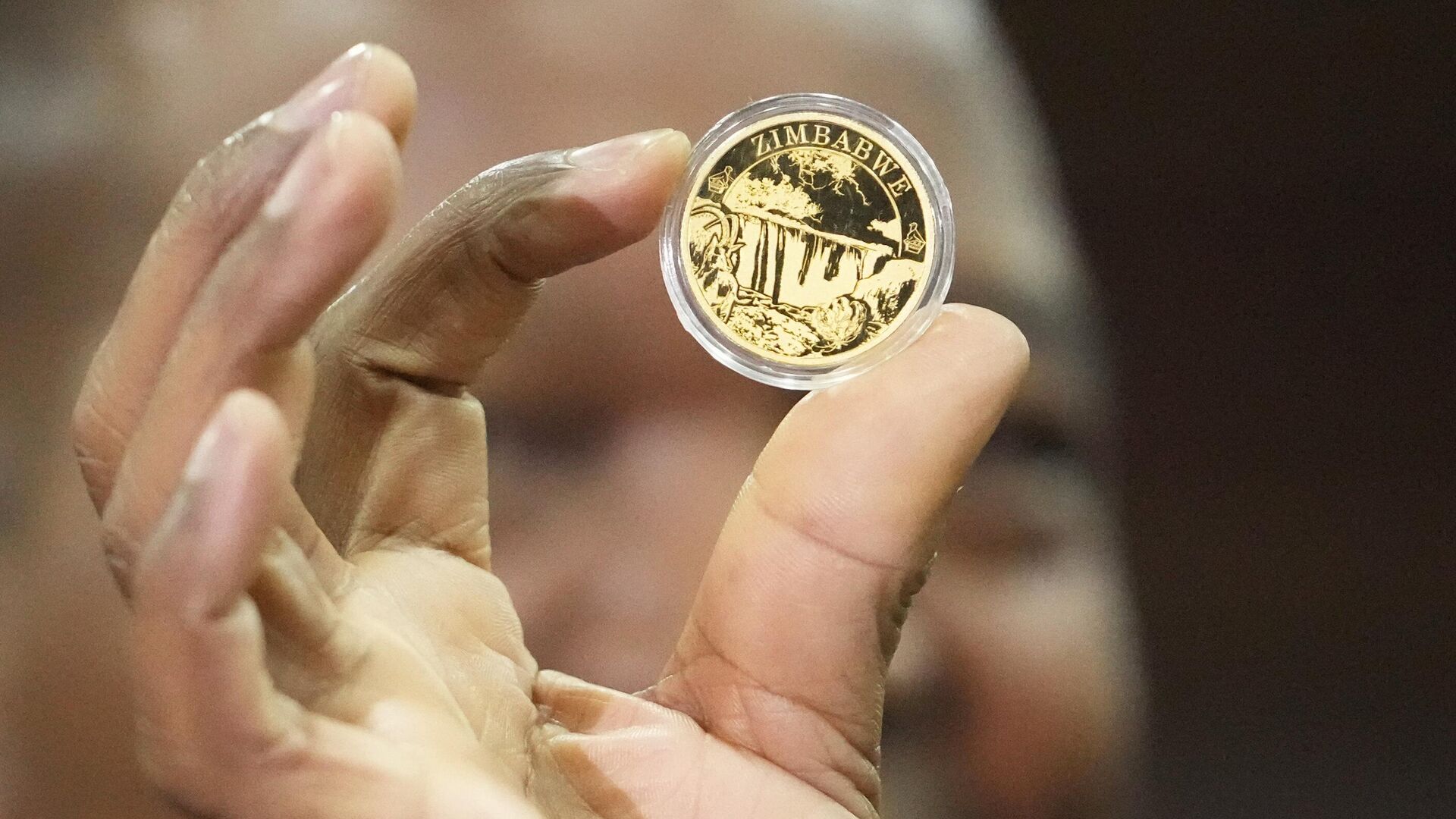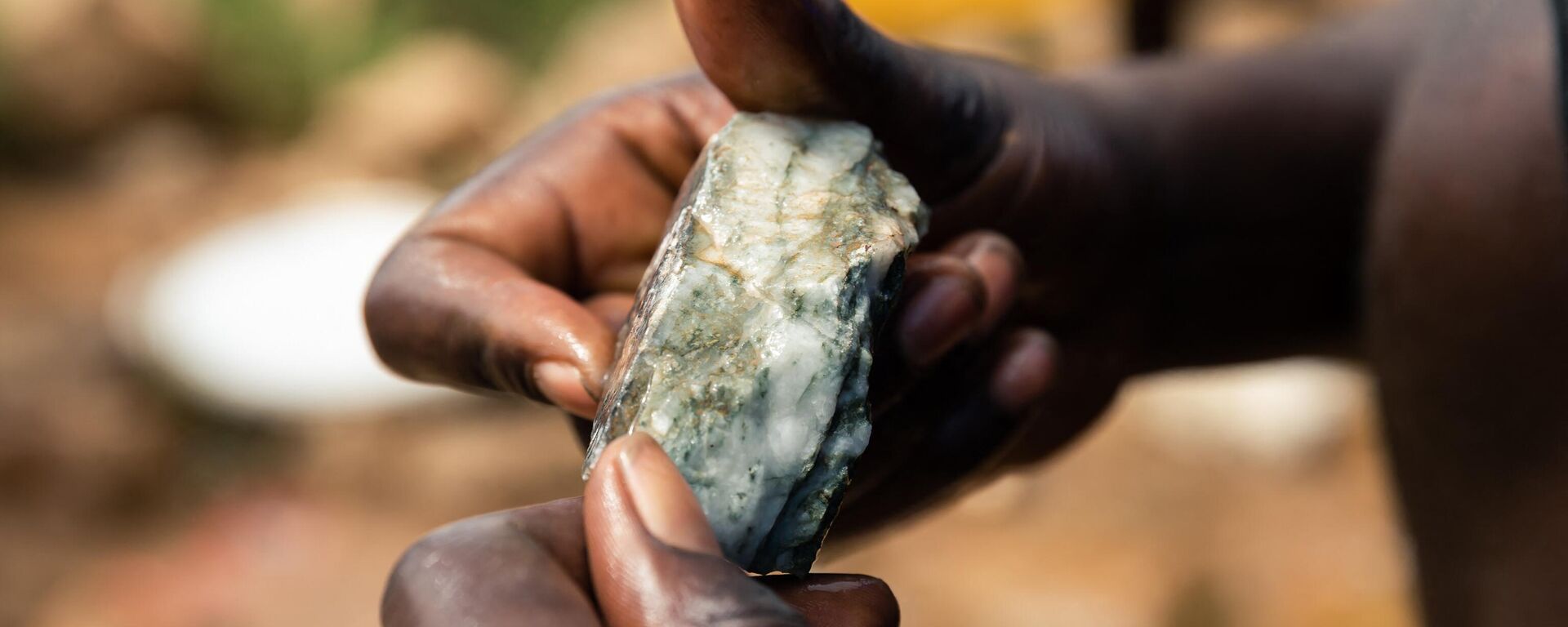https://en.sputniknews.africa/20230510/a-game-changer-all-you-need-to-know-about-zimbabwes-gold-backed-digital-currency-1059150252.html
A Game Changer? All You Need to Know About Zimbabwe's Gold-Backed Digital Currency
A Game Changer? All You Need to Know About Zimbabwe's Gold-Backed Digital Currency
Sputnik Africa
In this article, Sputnik explains what Zimbabwe's gold-backed digital currency is and how it works, as well as the benefits and risks of the e-currency. We will also take a look at the history of Zimbabwe's legal tender policies.
2023-05-10T12:22+0200
2023-05-10T12:22+0200
2023-08-03T10:44+0200
sub-saharan africa
southern africa
zimbabwe
gold
currency
alternative currency
cryptocurrencies
finance
economy
https://cdn1.img.sputniknews.africa/img/07e7/05/0a/1059154724_0:0:2818:1586_1920x0_80_0_0_c0ba5ef14f8222397ccba268e0a322c1.jpg
The Reserve Bank of Zimbabwe on Monday unveiled a gold-backed digital currency for the country, aimed at reducing its soaring inflation rates and supporting the value of the Zimbabwean dollar, which has been losing ground against major currencies since its re-introduction.The RBZ called on the public, including those in possession of previously introduced gold coins, to acquire the new digital tokens, saying they could be purchased either in Zimbabwean dollars or foreign currency.The e-currency is supposed to allow people who had small amounts of Zimbabwean dollars, also known as the real time gross settlement (RTGS) dollars, to exchange them for digital tokens that could store value and protect them from currency fluctuations.In this article, Sputnik explains what Zimbabwe's gold-backed digital currency is and how it works, as well as the benefits and risks of the e-currency. We will also take a look at the history of Zimbabwe's main legal tender policies.What Is Zimbabwe’s Gold-Backed Digital Currency, and How It Works?Zimbabwe's gold-backed digital currency is supported by a fixed quantity of gold, which contributes to its stable value and distinguishes it from fiat currencies. It will be used as legal tender and a store of value in conjunction with the Zimbabwean dollar and bond notes, and can be bought and sold using both local and foreign currencies. The digital currency's gold backing necessitates a specific quantity of gold reserves and is reliant on the current market value of gold. According to state-owned media, Zimbabwe had 350 kilograms (12,346 ounces) of gold reserves, worth an estimated $22.80 million in late April, with plans to increase reserves to approximately $100 million. It's worth noting that in 2022, the southern African country's gold output was 19.5% higher than the previous year, reaching a total of 35.38 metric tons thanks to new mining projects, timely payments, and incentives for large-scale gold producers, according to Fidelity Gold Refineries, the country's only licensed gold buyer, wholly owned by the Reserve Bank of Zimbabwe.Zimbabwe's gold-backed digital tokens have a 180-day vesting period, after which they are redeemable at international rates. The e-currency is considered a prescribed asset and can be used as collateral for loans. The RBZ has started selling the new digital tokens at a minimum price of $10 for individuals and $5,000 for companies and other entities.Benefits and Risks of Zimbabwe's Gold-Backed Digital CurrencyZimbabwe is not the first African nation to introduce a gold-backed e-currency, as countries such as Ghana, Nigeria and South Africa have introduced such currencies in recent years, while several others are exploring the prospect of introducing them.From an economic perspective, the introduction of a gold-backed digital currency could bring some benefits to Zimbabwe.By backing the digital currency with gold, the Reserve Bank of Zimbabwe can provide a sense of stability and security to investors who might otherwise be concerned about the country's economic instability.In addition, as mentioned above, the gold-backed digital currency can store value and protect against currency fluctuations, as the Zimbabwean GRTGS dollar is one of the weakest currencies in the world.Despite the potential benefits, there are risks associated with the use of digital currencies. Not surprisingly, the most significant risk is the possibility of fraud and hacking. In addition, the International Monetary Fund (IMF) has advised the Zimbabwean government against using a gold-backed digital currency to address economic challenges, such as the instability of the local currency. Instead, the IMF recommended that the government liberalize its foreign-exchange market, warning that introducing a gold-backed digital currency as legal tender alongside the Zimbabwean dollar could undermine remaining confidence in the local currency.History of Zimbabwe's Main Legal Tender PoliciesZimbabwe has had a tumultuous economic history, with its currency experiencing hyperinflation and losing value rapidly. Zimbabwe's economic system was particularly devastated by harsh US and EU sanctions imposed against the country more than 20 years ago.According to a 2020 report of the Southern African Development Community (SADC), Zimbabwe "lost well over $42 billion in revenue over the past 19 years because of the sanctions" with a negative influence on most sectors of its economy and the investment climate.In 2009, the government abandoned the Zimbabwean dollar and adopted a multi-currency system. The US dollar, along with other major currencies – such as the euro, the British pound and the South African rand, became the most commonly used currencies in Zimbabwe. In 2016, the government introduced bond notes as a way to ease the cash shortage in the Southern African country. However, this move was met with skepticism and did little to address the underlying economic issues in Zimbabwe.Three years after the introduction of bond notes in 2016, Zimbabwe was forced to abandon the use of the multi-currency system due to cash shortages and replace it with the new Zimbabwean RTGS dollar.As part of a broader plan by the central bank to stabilize the country's local currency, the Reserve Bank of Zimbabwe introduced gold coins in 2022 as part of its efforts to promote the use of gold as a currency.Zimbabwe's gold-backed digital currency comes a year after the RBZ introduced gold coins in the hope that this new initiative will help stabilize the country's economy.
https://en.sputniknews.africa/20230111/1059148919.html
https://en.sputniknews.africa/20230508/oil-gas-and-helium-found-in-zimbabwe-by-australia-listed-invictus-energy-1059120695.html
southern africa
zimbabwe
Sputnik Africa
feedback@sputniknews.com
+74956456601
MIA „Rossiya Segodnya“
2023
Muhammad Nooh Osman
https://cdn1.img.sputniknews.africa/img/07e7/04/0a/1058467512_0:0:1280:1280_100x100_80_0_0_ec723833bcbfcaed2e21952965ad99e4.jpg
Muhammad Nooh Osman
https://cdn1.img.sputniknews.africa/img/07e7/04/0a/1058467512_0:0:1280:1280_100x100_80_0_0_ec723833bcbfcaed2e21952965ad99e4.jpg
News
en_EN
Sputnik Africa
feedback@sputniknews.com
+74956456601
MIA „Rossiya Segodnya“
Sputnik Africa
feedback@sputniknews.com
+74956456601
MIA „Rossiya Segodnya“
Muhammad Nooh Osman
https://cdn1.img.sputniknews.africa/img/07e7/04/0a/1058467512_0:0:1280:1280_100x100_80_0_0_ec723833bcbfcaed2e21952965ad99e4.jpg
all you need to know, zimbabwe’s gold-backed digital currency, digital currency, zimbabwe gold coins, zimbabwe digital currency, zimbabwe gold-backed digital currency, gold coins, reserve bank of zimbabwe, rbz,
all you need to know, zimbabwe’s gold-backed digital currency, digital currency, zimbabwe gold coins, zimbabwe digital currency, zimbabwe gold-backed digital currency, gold coins, reserve bank of zimbabwe, rbz,
A Game Changer? All You Need to Know About Zimbabwe's Gold-Backed Digital Currency
12:22 10.05.2023 (Updated: 10:44 03.08.2023) Muhammad Nooh Osman
Writer/Editor
The release of the new gold-backed digital currency comes less than a year after the Reserve Bank of Zimbabwe (RBZ) introduced one-ounce, 22-karat gold coins into circulation in July 2022 in an effort to combat soaring inflation in the years that have followed the latest failed reboot of the Zimbabwean dollar.
The Reserve Bank of Zimbabwe
on Monday unveiled a gold-backed digital currency for the country, aimed at reducing its soaring inflation rates and supporting the value of the Zimbabwean dollar, which has been losing ground against major currencies since its re-introduction.
The RBZ called on the public, including those in possession of previously introduced gold coins, to acquire the new digital tokens, saying they could be purchased either in Zimbabwean dollars or foreign currency.
"Holders of physical gold coins, at their discretion, will be able to exchange or convert, through the banking system… into gold-backed digital tokens," the RBZ said in a statement.
The e-currency is supposed to allow people who had small amounts of Zimbabwean dollars, also known as the real time gross settlement (RTGS) dollars, to exchange them for digital tokens that could store value and protect them from currency fluctuations.
In this article, Sputnik explains what Zimbabwe's gold-backed digital currency is and how it works, as well as the benefits and risks of the e-currency. We will also take a look at the history of Zimbabwe's main legal tender policies.
What Is Zimbabwe’s Gold-Backed Digital Currency, and How It Works?
Zimbabwe's gold-backed digital currency is supported by a fixed quantity of gold, which contributes to its stable value and distinguishes it from fiat currencies. It will be used as legal tender and a store of value in conjunction with the Zimbabwean dollar and bond notes, and can be bought and sold using both local and foreign currencies.
The digital currency's gold backing necessitates a specific quantity of gold reserves and is reliant on the current market value of gold. According to state-owned media, Zimbabwe had 350 kilograms (12,346 ounces) of gold reserves, worth an estimated $22.80 million in late April, with plans to increase reserves to approximately $100 million.
It's worth noting that in 2022, the southern African country's gold output was 19.5% higher than the previous year, reaching a total of 35.38 metric tons thanks to new mining projects, timely payments, and incentives for large-scale gold producers, according to Fidelity Gold Refineries, the country's only licensed gold buyer, wholly owned by the Reserve Bank of Zimbabwe.
Zimbabwe's gold-backed digital tokens have a 180-day
vesting period, after which they are redeemable at international rates. The e-currency is considered a prescribed asset and can be used as collateral for loans.
The RBZ has started selling the new digital tokens at a minimum price of $10 for individuals and $5,000 for companies and other entities.
Benefits and Risks of Zimbabwe's Gold-Backed Digital Currency
Zimbabwe is not the first African nation to introduce a gold-backed e-currency, as countries such as Ghana, Nigeria and South Africa have introduced such currencies in recent years, while several others are exploring the prospect of introducing them.
From an economic perspective, the introduction of a gold-backed digital currency could bring some benefits to Zimbabwe.
By backing the digital currency with gold, the Reserve Bank of Zimbabwe can provide a sense of stability and security to investors who might otherwise be concerned about the country's economic instability.
In addition, as mentioned above, the gold-backed digital currency can store value and protect against currency fluctuations, as the Zimbabwean GRTGS dollar is one of the weakest currencies in the world.
Despite the potential benefits, there are risks associated with the use of digital currencies. Not surprisingly, the most significant risk is the possibility of fraud and hacking.
In addition, the International Monetary Fund (IMF) has advised the Zimbabwean government against using a gold-backed digital currency to address economic challenges, such as the instability of the local currency. Instead, the IMF recommended that the government liberalize its foreign-exchange market, warning that introducing a gold-backed digital currency as legal tender alongside the Zimbabwean dollar could undermine remaining confidence in the local currency.
History of Zimbabwe's Main Legal Tender Policies
Zimbabwe has had a tumultuous economic history, with its currency experiencing hyperinflation and losing value rapidly. Zimbabwe's economic system was particularly
devastated by harsh US and EU sanctions imposed against the country more than 20 years ago.
According to a 2020 report of the Southern African Development Community (SADC), Zimbabwe "lost well over $42 billion in revenue over the past 19 years because of the sanctions" with a negative influence on most sectors of its economy and the investment climate.
In 2009, the government abandoned the Zimbabwean dollar and adopted a multi-currency system. The US dollar, along with other major currencies – such as the euro, the British pound and the South African rand, became the most commonly used currencies in Zimbabwe.
In 2016, the government introduced bond notes as a way to ease the cash shortage in the Southern African country. However, this move was met with skepticism and did little to address the underlying economic issues in Zimbabwe.
Three years after the introduction of bond notes in 2016, Zimbabwe was forced to abandon the use of the multi-currency system due to cash shortages and
replace it with the new Zimbabwean RTGS dollar.
As part of a broader plan by the central bank to stabilize the country's local currency, the Reserve Bank of Zimbabwe introduced gold coins in 2022 as part of its efforts to promote the use of gold as a currency.
Zimbabwe's gold-backed digital currency comes a year after the RBZ introduced gold coins in the hope that this new initiative will help stabilize the country's economy.




